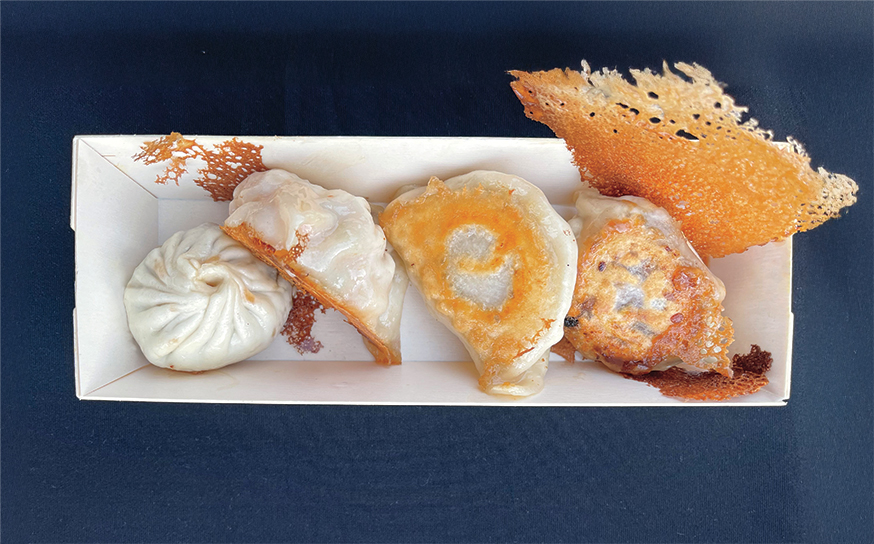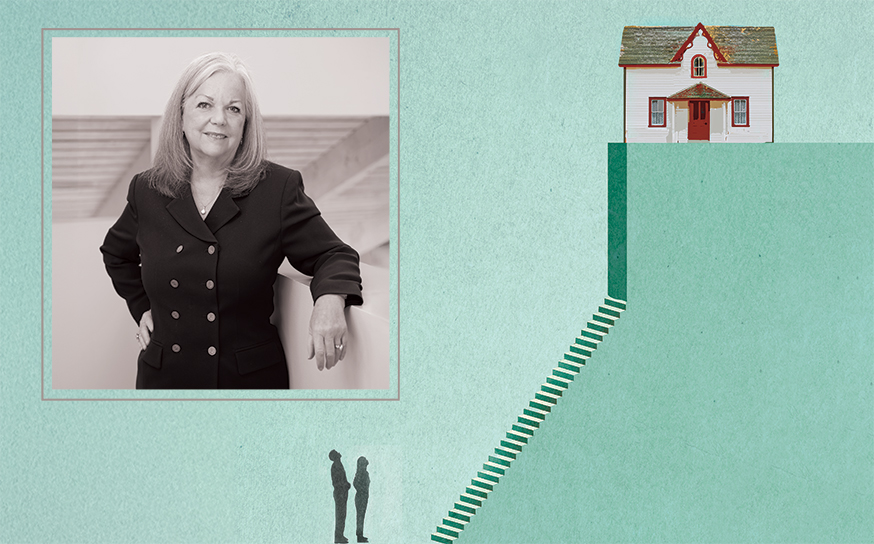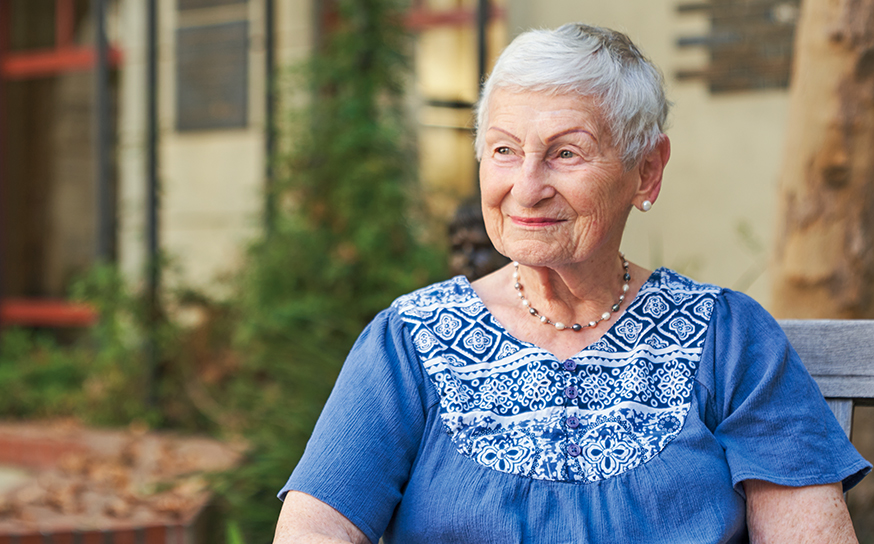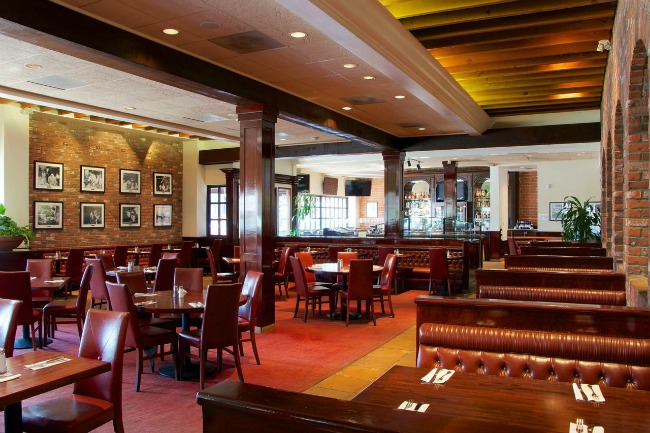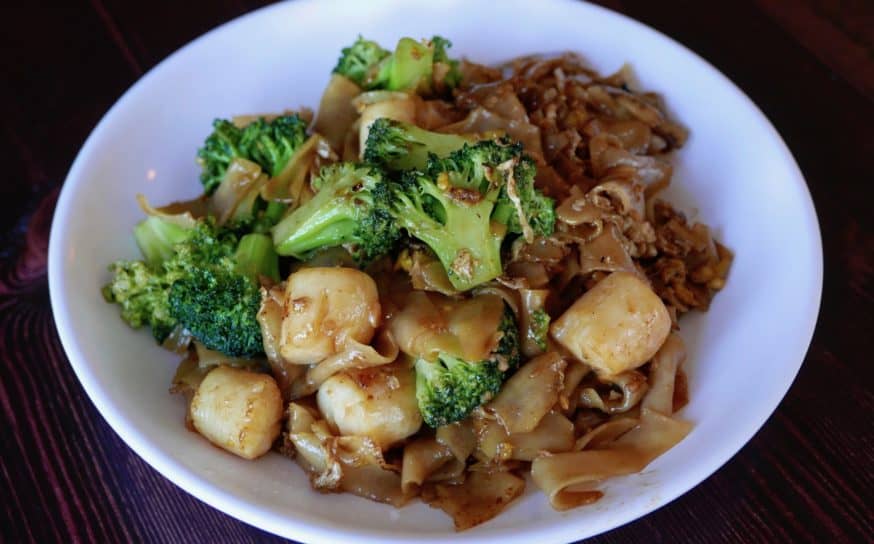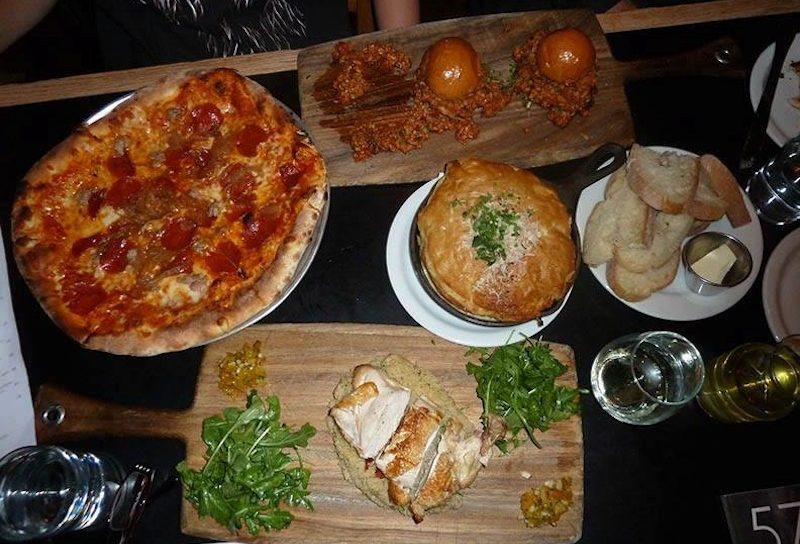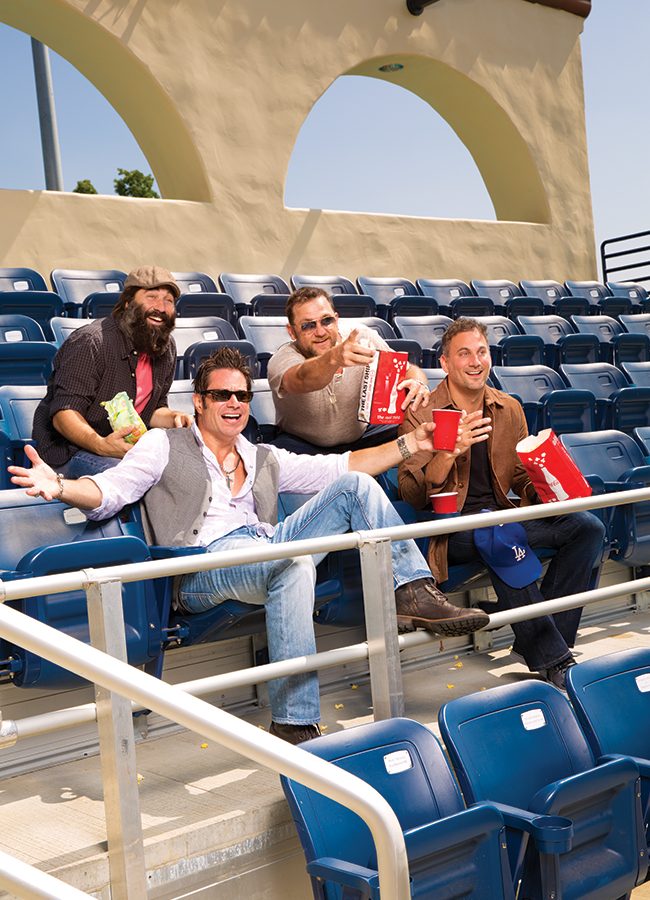
Empire State to the 818
Meet an elite group of restaurateurs, all originally from New York, who are behind some of the Boulevard’s most successful dining destinations and in front of the movement that’s putting Valley dining squarely on the map.
-
CategoryPeople
-
Written byRachel Heller Zaimont
At a Thursday night pre-opening party at Tunnel Bar one week before the lounge’s launch, Richard DiSisto surveyed the crowd. It was a sweltering May evening in the Valley, and the nightspot’s air conditioning had hiccupped. But that didn’t dampen the mood as guests sipped cocktails and gabbed on the low-lit benches and barstools. In a moment of downtime between greetings, he rubbed his hands together and smiled. “It’s good to see people in here,” he mused. “I’ve been waiting a long time for this.”
Richard, a New York native whose company, Vantage Restaurant Group, also owns the recently opened Tipple & Brine (beneath Tunnel Bar) and Mad Bull’s Tavern (currently being converted into a gastropub) just a few doors down, has been slowly transforming this block of Sherman Oaks with his sharp eye for atmosphere and East Coast sensibility. But nowhere are his Empire State roots more apparent than at this cozy upstairs libation room. The bar’s brick arch design pays homage to the Brooklyn-Battery Tunnel.
“My inspiration was that tunnel,” he explains. “I thought, ‘Imagine if you could stick a bar right across the mouth of the Brooklyn-Battery Tunnel. Wouldn’t that be cool?’ It’s a throwback to the whole early ‘70s New York underground vibe—capturing the moment and the flavors of what it was to be there.”
Richard is part of a wave of restaurateurs who have built successful empires in a formerly unhip hinterland of LA: the Valley. It’s no secret that Ventura Boulevard’s dining scene is finally hitting its stride, as trendy taverns and upscale eateries once unheard of here move in—and, in the process, revitalize the community.
But it might come as a surprise that a couple of Big Apple visionaries are behind some of the hottest local haunts. In addition to their home state, they also share a sense of the potential waiting to be tapped in the 818.

Yet the question remains: What makes the Valley suddenly so appealing to these New York transplants?
“The Valley is a community, something we’re familiar with from the East Coast,” says Mario Guddemi, who co-owns The Local Peasant restaurants in Sherman Oaks and Woodland Hills with cousin Salvatore Aurora and longtime pal Karl Makinen. He and Sal also own Black Market Liquor Bar in Studio City. “We all grew up in our specific neighborhood, with our specific restaurants and bars that we would visit.”
 For Mario and Sal, those neighborhoods were on Staten Island. Mario’s father owned an Italian seafood restaurant, and Sal’s father was his business partner. Sal and his father eventually moved to Long Island, where the family opened a pizzeria.
For Mario and Sal, those neighborhoods were on Staten Island. Mario’s father owned an Italian seafood restaurant, and Sal’s father was his business partner. Sal and his father eventually moved to Long Island, where the family opened a pizzeria.
“We both grew up in the restaurant business ever since we were kids,” Mario recalls. “We started off washing dishes, moved on to learning how to do prep work and then we got into making pizzas. We went through the ranks, up until college.”
Richard was also born into a restaurant family. His grandparents emigrated from Italy to the Bronx, where they ran an Italian restaurant attached to a small bar. “My grandfather realized, ‘Hey, the economy is going up and down, but I can always sell whiskey,’” he says.
Growing up in New Rochelle, New York, his father’s parents’ restaurant was something of a playground for young Richard. “I still remember the smell of the pizza and pasta,” he recalls. “We’d go knock on the screen door in back of the restaurant and ask for some pizza dough to play with.”
As a teen Richard became a busboy at a diner. By the time he was 20, his family owned a nightclub, and he learned bartending—a skill that came in handy when he moved to LA to try his hand at acting. He began pouring drinks at trendy ‘80s nightspot Vertigo and climbed the ladder from there.
“Bartending led to managing, led to designing, led to building, led to promoting, led to overseeing the operations,” he says. “Everywhere I worked, I started realizing, ‘I could do this better.’”
It was a similar trajectory for Karl, who was born in Queens and grew up on Long Island. He started washing dishes at restaurants at age 13, and after moving to LA to pursue acting nearly 30 years ago, he worked as a waiter at Four Oaks on Beverly Glen and West Hollywood mainstay Mirabelle. Over the years, he developed a sixth sense for what made an eatery work.
“That quality just wasn’t in the Valley,” recalls Karl, who at the time lived near Toluca Lake. “There were certain spots I loved, but none of them really put it all together.”
Karl met Mario, who had also moved to LA and was working as a waiter, in the late ‘90s. Mario was fresh off a stint working for a consulting firm in New York City and felt the tug of the restaurant industry he’d grown to know so well. He invited Sal to move west to start a business together.
In 2002 Sal and Mario kicked off their partnership with Level One Restaurant & Supper Club in the Beverly Grove neighborhood, which they ran for five years. Coincidentally the owners of Rocco’s Tavern in Studio City—also Staten Island natives—operated an Italian eatery next door. Next the two cousins moved into sports bar territory with The Happy Ending in Hollywood.
But thoughts of the Valley began to swirl in their minds. “Karl was always telling us, ‘Hey, there’s great opportunity in the Valley. You guys have to come, and we have to do something in the Valley,” Mario recalls.

There was just one problem: the uncool reputation that clung to the 818. “They were like, ‘People make fun of the Valley—how can we open a place there?’” Karl remembers. Adds Mario, “Crossing over, that stigma was all you used to hear.”
Richard heard it too. Stopping into Aroma Coffee & Tea one day, an acquaintance told him about a run-down jazz club for sale in Toluca Lake. At first he balked, but then he realized this was his chance to run a venue his way.
He bought the bar, renovated it with a group of friends and in 2005 opened Lucy’s 51, which quickly became a staple for live music and stiff drinks. “This is our chance to take over the Valley,” he told a friend at the time. He hasn’t looked back.
Since then, Richard has opened a series of bars and restaurants along Ventura Boulevard—most notably Mad Bull’s Tavern, which with its outdoor patio packed with 20-somethings heralded a hip new era for downtown Sherman Oaks when it opened in 2010. Mad Bull’s is now slated for a makeover, much like Richard’s nearby Spitting Chicken Cantina locale, which he revamped as the oyster-themed Tipple & Brine this past April.
And that seems to be just the beginning. Richard has been working on an ambitious blueprint for a multi-venue dining destination that he hopes will keep sophisticated crowds from migrating over the hill. His plan is already in progress: Tunnel Bar, the secluded, second-floor lounge above Tipple & Brine, opened in May, and he’s currently designing two more spaces in the same structure. Details of both are still under wraps, but for now let’s just say patrons will have a view.
“Richard’s little ‘restaurant row’ has totally turned around a sadly derelict north side of Ventura Boulevard,” says Jeffrey Kalban, an award-winning local architect who, alongside the Sherman Oaks Homeowners Association, has been working on a revitalization plan—complete with a riverwalk—for the area. “His restaurants have brought life to Sherman Oaks and have shown others that the area has the market for them to tap into. The successful On The Thirty, across the street, came in after Richard’s first establishments.”
Richard, who has invested a fair bit of his own money in his projects, admits he sees himself as something of a visionary—all part of his quest to do right by his parents. “Never will a day go by that I don’t honor my mother and father—I’ll constantly be proving to them and myself that I learned something from them. I just needed a place for that to happen. And the place, for me, turned out to be Sherman Oaks.”
Farther east, another Sherman Oaks block set the perfect stage for Sal, Mario and Karl’s entry into the Valley dining scene when they discovered the once-great Cozy’s Bar & Grill. The location worked; the space felt right. “That was a moment when we knew ‘This is it!’” Karl recalls.
“We all sat down and came up with the concept,” Mario explains. “We wanted to create a place that was great for the community, that fit in the neighborhood—a social gathering spot with delicious drinks and food.”
The first Local Peasant opened in late 2010 to clamorous acclaim. The following year, Mario and Sal flipped Studio City’s Wine Bistro into the sleek Black Market Liquor Bar. And in 2013 the second Local Peasant debuted in Woodland Hills—with scouting now underway for future locations, potentially also on this side of the hill. “We love the Valley,” Sal says. “There’s great opportunity, and customers are loyal.”
The trio has carried their New York heritage inside their LA restaurants. The pizza and meatballs on The Local Peasant’s menu were family recipes, Sal says. Even the flavor of their classic hamburger is modeled on the burgers they ate as kids.
And echoes of New York permeate the pub’s décor in the white subway tile that adorns one wall. “You don’t realize it when you’re designing, but you pull things from your childhood,” Mario says.
None of their restaurants have signs out front. But the speakeasy-era strategy has worked for them.
“It’s not about being cool or popular … because it is always a big risk opening a restaurant, with no guarantees,” Karl explains. “We believe that not having a sign creates a grassroots, word-of-mouth vibe that gives it a very local feel and empowers the customer to tell their other friends (if we do it right), because they found the place and it is their little secret.”
As revitalization ripples along the Ventura Boulevard corridor, Richard admits he has had to contend with some resistance from the community. “In the Valley, we’re going through the same thing Downtown had to go through and Culver City went through,” he says. “People don’t like change. The ‘renaissance’ phase is tough. You have to stay the course.”
Despite initial grumbles over the loss of Cozy’s, Karl says the positive reactions of the first patrons of The Local Peasant told him they were on the right track. “It’s amazing—when we first opened here and in Woodland Hills, people would walk in and go, ‘This is exactly what we needed in the neighborhood!’ They would say that before they ate or drank anything, before they knew if the service was good or bad,” he recalls, laughing. “I think when you do things right, people just get it.”
And, it seems, it took a handful of New Yorkers to seize the opportunity. Former New Yorkers, that is. “Being born and raised in New York was an incredible experience, but now in our adult lives, this is where we want to be,” Sal says, gesturing to their spacious Sherman Oaks restaurant on a warm afternoon.
“This is home.”





